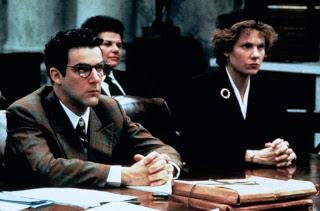 Sidney Lumet's Daniel (1983) is a glum, curiously muted document. I use that word advisedly; it feels more like a docudrama than a narrative film, so devoid is it of any feeling towards its subject. From a director whose films usually brim with passionate anger, his adaptation of E.L. Doctorow's The Book of Daniel rarely allows for more than polite interest.
Sidney Lumet's Daniel (1983) is a glum, curiously muted document. I use that word advisedly; it feels more like a docudrama than a narrative film, so devoid is it of any feeling towards its subject. From a director whose films usually brim with passionate anger, his adaptation of E.L. Doctorow's The Book of Daniel rarely allows for more than polite interest.Parallel storylines follow the fate of the Isaacsons: immigrants Paul (Mandy Patinkin) and Rochelle (Lindsay Crouse), executed for espionage in the 1950s, and their children Daniel (Timothy Hutton) and Susan (Amanda Plummer). Paul and Rochelle become deeply involved in the Communist Party, taking party in rallies, protests and other activism until they're fingered as atomic spies at the height of the Red Scare. Their children are orphaned, passed between relatives, friends and orphanages until they grow into deeply damaged adults. After Susan suffers a breakdown, Daniel tries to untangle the truth behind their parents' lives, desperate to prove their innocence.
Loosely based on atomic spies Julius and Ethel Rosenberg, Doctorow's novel is a fascinating, sometimes overwrought but always compelling plea for the souls of dissidents and outcasts, political, cultural and otherwise. Daniel remains faithful to the outlines of its source material but drains it of all the passion and portraiture. Which is strange, considering Lumet's own background in political activism: his parents were involved in causes similar to the Isaacsons in the '30s, and his best films (12 Angry Men, Serpico) bleed anguish and outrage. No such emotions animate Daniel, which seems strangely determined to be staid as possible.
At its best, Daniel is a handsome movie. Cast in Andrzej Bartkowiak's sepia-toned cinematography, the flashbacks evince an innocent nostalgia for the halcyon days of the Old Left. Lumet stages political rallies, strikes and speeches with a technician's clinical skill, evoking atmosphere if not immersiveness. One set piece recreates the notorious Peekskill Riots, where right wing vigilantes attacked a progressive concert headlined by Paul Robeson and Pete Seeger. Another, singularly bizarre scene has Daniel and Susan, still children, being passed over a crowd of cheering socialists protesting their parents' execution. Along with the use of Robeson and other period ballads, the movie's flashbacks at least invoke their period successfully.
The problem is, these seem so detached that they don't register. Lumet presents these events in snippets so brief they seem more like documentary recreations than set pieces. There's no effort to probe or question the era's politics: whether Paul or Rochelle should have been stumping for Stalin alongside more defensible causes, let alone whether they were guilty, naive or subdued fanatics. Sometimes Lumet focuses on the children's perspective, limited to what they see, but other scenes depict Paul and Rochelle without their kids present, rendering that device moot. Moments of personal inflection (Paul lecturing Daniel about sports and advertising, Daniel and Susan's stay in an abusive orphange) register strongly, but vanish before leaving much impression.
The modern day plotline, meanwhile, is a complete dud. Timothy Hutton plays Daniel as an unlikeable burnout who's constantly humiliating his sister and wife (Ellen Barkin), mocking their involvement in the counterculture and antiwar movement until Susan's extremities drive him to action. Daniel flits between friends, lawyers and witnesses trying to untangle his parents' guilt or innocence, without success; yet there's not enough urgency or connection to render this compelling. Weird theatrical devices - replaying past dialog as narration, Daniel lecturing the camera about methods of execution - make it even harder to connect.
Ultimately, there's very little to commend Daniel. There are some worthwhile performances (Mandy Patinkin's restrained fanatic, Ed Asner's benevolent attorney) and respectable historical recreations, but the overall impression is indifference. It's a political film that won't examine its own politics; a character study with flat characters; an historical drama with only a superficial grasp on history (let's not get into the issue of the Rosenberg's probable guilt). In short, it's a misguided, self-important dud.

